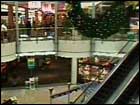|
Chain store sales weak
|
 |
December 11, 2001: 10:45 a.m. ET
Big retailers' sales slip from prior week but increase from year ago.
|
NEW YORK (CNN/Money) - Retailers continue to post disappointing holiday sales, with numbers falling from the previous week as warm weather and a weak economy continued to put a crimp on holiday shopping, according to a pair of reports Tuesday.
Chain store sales for the week ended Dec. 8 fell 0.4 percent from the previous week as warmer-than-expected weather at the beginning of the period continued to hamper sales, according to the latest figures from Bank of Tokyo-Mitsubishi and UBS Warburg Tuesday.
"One word - dismal. There's nothing else to be said but absolutely dismal," Kurt Barnard, president of Barnard's Retail Consulting Group, said of Tuesday's numbers.
Compared with a year ago, however, sales did increase 3 percent as consumers bought toys, artificial Christmas trees, holiday lights, new video-game offerings, shoes, hardware and entertainment, the report said.
Separately, Redbook, a unit of Instinet, reported a whopping 4.5 percent decline in its weekly retail sales index. And sales fell 0.9 percent from a year ago, according to the latest Redbook report, which also cited unseasonably warm weather as hampering sales of winter apparel and other merchandise.
The reports came just hours before the Federal Reserve's scheduled announcement on whether it will impose an 11th interest rate cut this year to help bolster the economy, two-thirds of which is fueled by consumer spending.
Last week, the nation's retailers reported disappointing November sales at stores open at least a year, a key gauge known as same-store sales.
"Sales are going the way they did in the last two years, which was after Thanksgiving, things settled down. But we also see, I think, the power of weather on these numbers," said Michael Niemira, a senior economist at Bank of Tokyo-Mitsubishi who authors the weekly sales report.
Analysts and industry trade groups have been predicting sluggish holiday sales this year in the shadow of an economic recession spurred by the Sept. 11 terrorist attacks on the World Trade Center and Pentagon that killed thousands. However, many still anticipate sales will grow from a year ago, albeit not as strongly as initially hoped.
The National Retail Federation predicts overall holiday sales will increase 2.5 percent to 3 percent compared with a year ago.
Niemira said Tuesday he anticipates a flat to 1 percent increase in December sales compared with a year ago.
Retailers have been struggling with a slowing economy all year as companies slashed hundreds of thousands of jobs as demand ebbed in the face of the burst technology bubble a year ago.
Increasingly cautious consumers shifted their dollars to discount stores such as Wal-Mart Stores Inc. (WMT: down $0.50 to $53.77, Research, Estimates) and Target Corp. (TGT: down $0.87 to $35.83, Research, Estimates) and shied away from traditional department stores such as Macy's and Bloomingdale's parent Federated Department Stores (FD: down $0.50 to $36.05, Research, Estimates) and specialty shops such as Limited Inc. (LTD: down $0.03 to $13.90, Research, Estimates) and The Sharper Image. (SHRP: up $0.25 to $10.30, Research, Estimates).
"Consumer spending is avoiding the mall-based, high-priced stores and is now drifting rapidly to the discount and low-priced segment," Barnard said.
Barnard predicts discount chains and low-priced retailers, such as Wal-Mart, Costco Wholesale Club (COST: down $0.35 to $42.04, Research, Estimates) and Kohl's Corp. (KSS: down $1.52 to $67.33, Research, Estimates) will log a 2.5 percent to 5 percent increase in holiday sales. But the rest of retailing, including traditional department stores and specialty shops, is likely to post flat sales to a decline.
However, things dramatically worsened in the days after the Sept. 11 attacks, as Americans stayed home to watch news coverage, worried about family, friends and their jobs, and feared being the victim of a second attack.
Click here for a look at retail stocks
Three months later, sales have bounced back somewhat, but not enough to help keep the economy out of a recession. In an effort to drive sales, retailers have been offering steep discounts and bargains.
While promotions have helped bring customers into the stores, they often hurt the bottom line by eroding gross margins.
Meanwhile "value" has crept back into retailers' and consumers' vocabulary.
"The big talk about value we haven't heard in 10 years since the last recession, but it comes back, and that's where we are now," Niemira said. "Will department stores pick up again? Sure, but it will require the economy to first turn around."
Fred Crawford, executive vice president of Cap Gemini Ernst & Young's consumer products, retail and distribution practice, said retailers likely to emerge from the holidays less bruised than others and better positioned for a recovery, are those who bite the bullet now and limit the number of discounts.
In exchange, he suggests where practicable, that retailers spend the money and energy now to ramp up customer service.
"I really think the display of human values is the key for the post-industrial Sept. 11 boom economy," Crawford said. "Now that we're into this recession, people are a little more tender than they were a few years ago, and a store that provides respect, dignity and basic human values is going to do well." 
|
|
|
|
|
|

|

